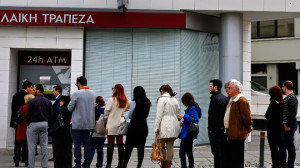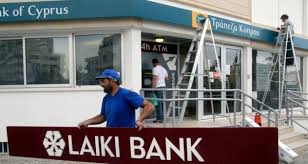Cyprus is a small island with a small population, and the country has recently been a victim of European austerity measures. This was the outcome of long-term bad economic governance, the high exposure of Cypriot banks in Greek bonds, the delay of the government to take appropriate measures, and its inability to fight tax evasion over the years.
The life before
Cyprus has faced the consequences of the Turkish invasion of 1974. Twenty years later, however, the island had fully recovered from the war. The Cypriots have had a high level of life, everybody had a job, and poverty did not exist.
The economy of Cyprus is based mainly on services and tourism. Manufacturing and agriculture contribute only a small percentage to the GDP.
What happened?
 The subprime mortgage crisis in the US and the effect on the rest of the world affected the island in 2009 and worsened during the consecutive years, mainly due to exposure in Greek debt. The major banks were exposed to Greek bonds, and they suffered heavy losses from the write-down agreement of the Greek bonds in October 2011. They were also exposed to non-performing loans in the Greek private sector, and these loans increased drastically.
The subprime mortgage crisis in the US and the effect on the rest of the world affected the island in 2009 and worsened during the consecutive years, mainly due to exposure in Greek debt. The major banks were exposed to Greek bonds, and they suffered heavy losses from the write-down agreement of the Greek bonds in October 2011. They were also exposed to non-performing loans in the Greek private sector, and these loans increased drastically.
During the years, there was also an increase in the country’s budget deficit. The deficit increased because of poor management of the money received from taxes. The highly rewarded government employees and their ridiculous financial benefits, accompanied by their very low production, are only one example of poor management. Also, the failure to fight tax evasion even until now shows the inability of the government to implement the law.
These budget issues led the government to make an agreement with Russia for a loan of €2.5bn in order to cover the deficit. Consequently, there were no saving margins to assist the problematic banks. The government´s inability to provide assistance to the banks led to downgrading the credit rating of Cyprus and the Cypriot banks. As a result, in March 2012 the credit rating of the Republic was downgraded to “junk.” Therefore, the government was unable to refund its expenses by international markets and turned to the European Union for financial assistance.
Although Cyprus was affected by the crisis since 2009, the government did not ask for assistance from the European Union until June 2012. The negotiations continued until November, when the basic terms of the bailout were agreed upon; but due to upcoming elections, the president did not want to finalize the agreement.
In March 2013, the Eurogroup decided on the closure of the second largest bank (Laiki Bank). Its insured deposits (up to €100000) and profitable activities were to be transferred to the first largest bank (Bank of Cyprus), whereas the uninsured amount was used for the bailout. A huge attempt is being made now for the survival of Bank of Cyprus; its depositors will suffer a haircut of 40 per cent, with an additional amount of 20 per cent withheld for the bank’s further recapitalization needs. The final amount of haircut has not been decided yet.
The life after
The sudden decision of the Eurogroup had a domino effect on the economy of Cyprus. Many businesses that faced haircut were shut down because they had no more money to finance their activities. Unemployment increased 1 per cent from March to April. The instability and the uncertainty of people for the future of the country have caused a panic. As an employee of the former Laiki Bank and a current employee of Bank of Cyprus, I am an everyday witness of this fact. The government had imposed several limits on bank transactions to prevent cash outflow, but every single day there is still a huge amount of cash outflow from the banking system. People withdraw the larger amount of money allowed and literally “sleep on it,” while others find various ways to take it abroad.
The “rich” citizen has become “average,” and the “average” citizen has become “poor.” Ordinary people are just fighting to pay their loan instalments and have food for the next day. Sadly, Cypriot citizens were highly dependent on bank loans. The rise of unemployment has made it difficult to meet their obligations; as a consequence, the non-performing loans of the banking sector increase drastically. The market has frozen.
Immigrants started to return to their home countries, and local people started to consider moving abroad. Many students who study abroad quit their studies, and those who finish their 12-year school education do not seek higher education.
Measures against the crisis
The existing government has taken some measures against unemployment, has cut unnecessary government expenses, and has taken some action to promote development. However, it has taken no measures against tax evasion. The measures taken until now are not essential. As a result, there seems no light at the end of the tunnel. People do not trust the government at all.
Many economists believe that the exit from the euro currency will be painful, but not as painful as the measures imposed by Troika. Some of them say that this is the one-way road. My opinion is that every possibility must be carefully considered by the government.
The last three months were one of the worst periods in Cyprus history. The possible failure of the new bank will be followed by the bankruptcy of the country as a whole. However, the government is trying to find ways to overcome these challenges. These uncertainties will be clarified this summer when Bank of Cyprus will be fully recapitalized. Until all these are clarified, we must wait and see what will happen.
By: Anna Stilianou – CWAN Global Press European correspondent

